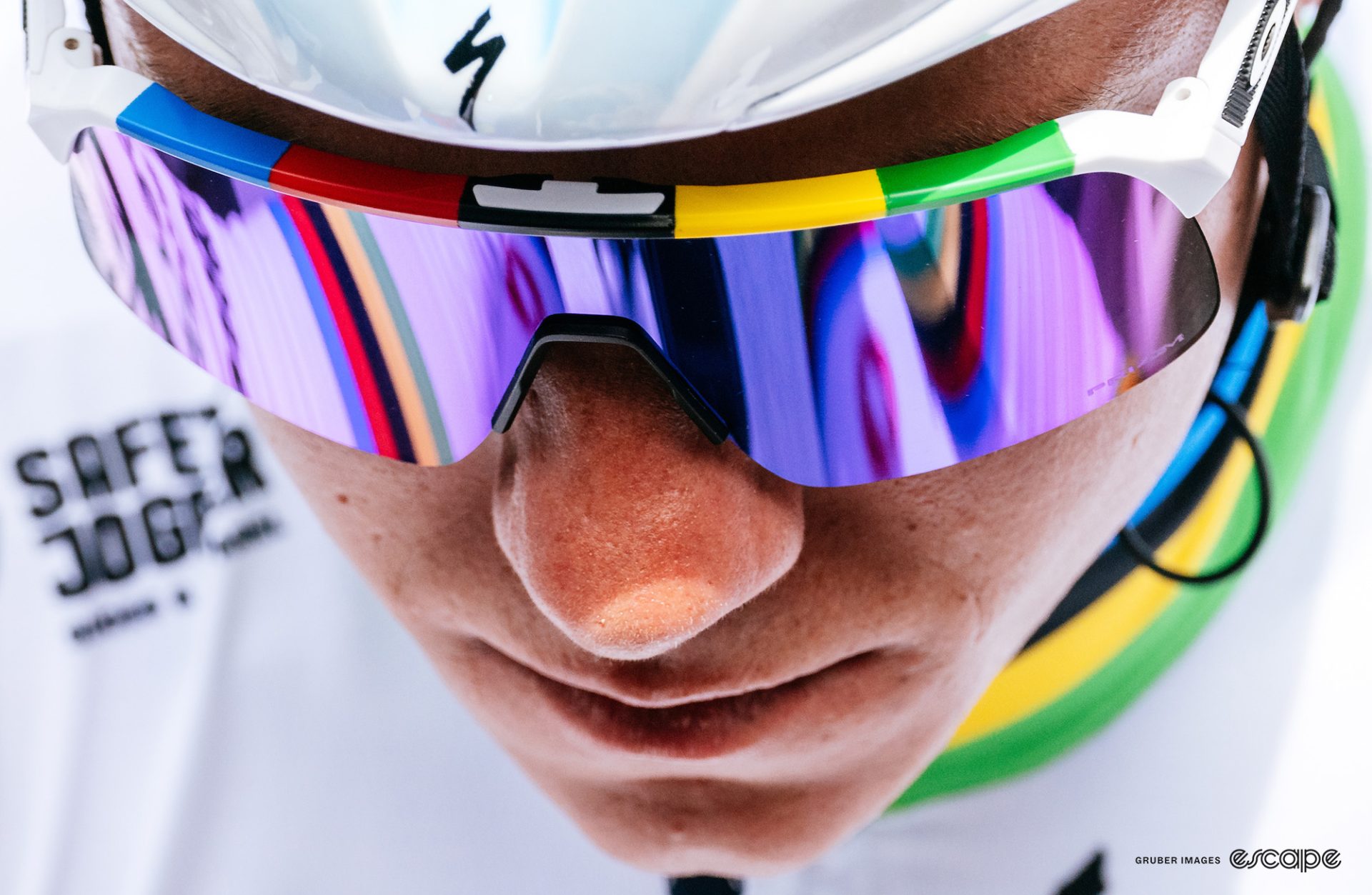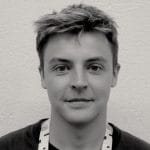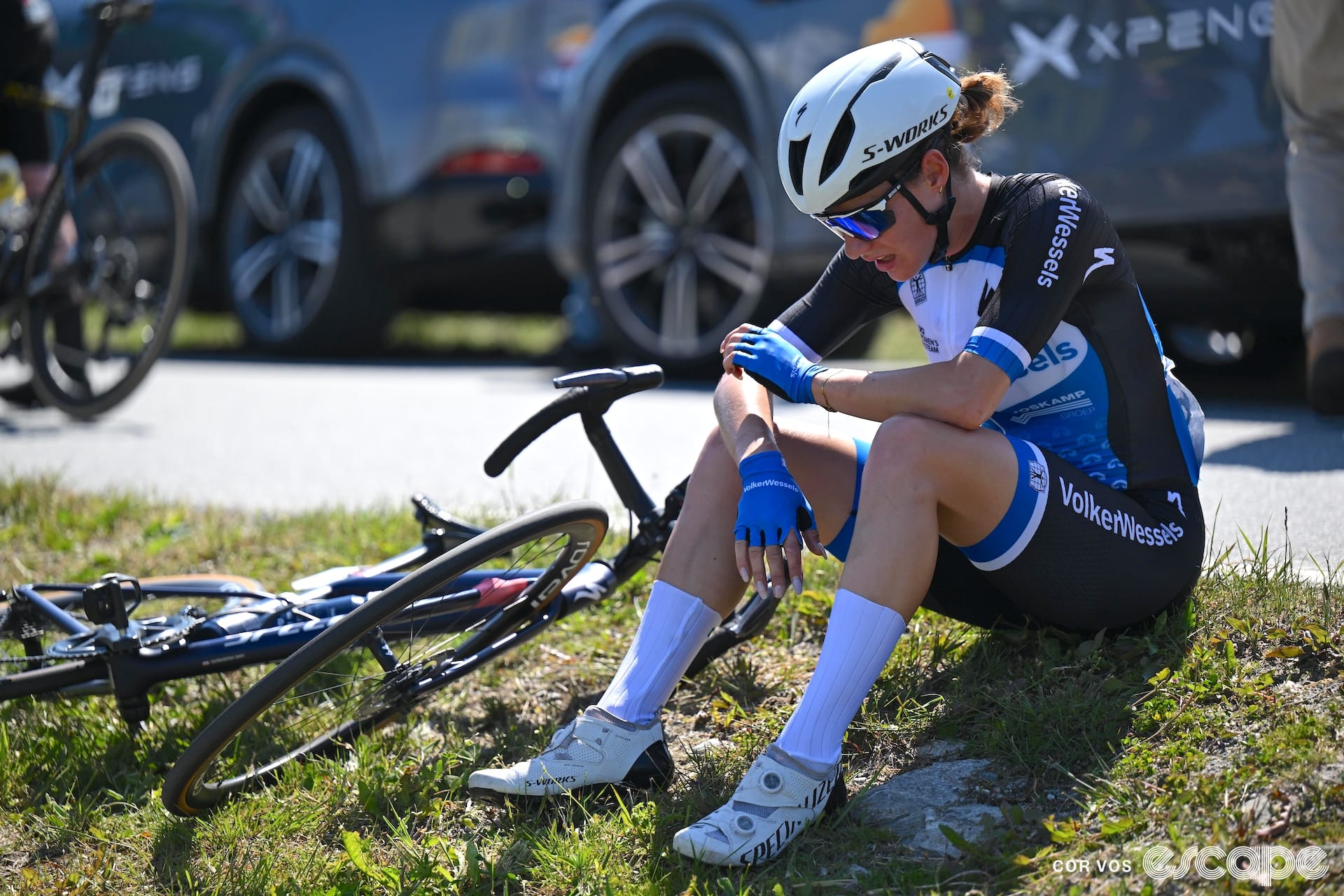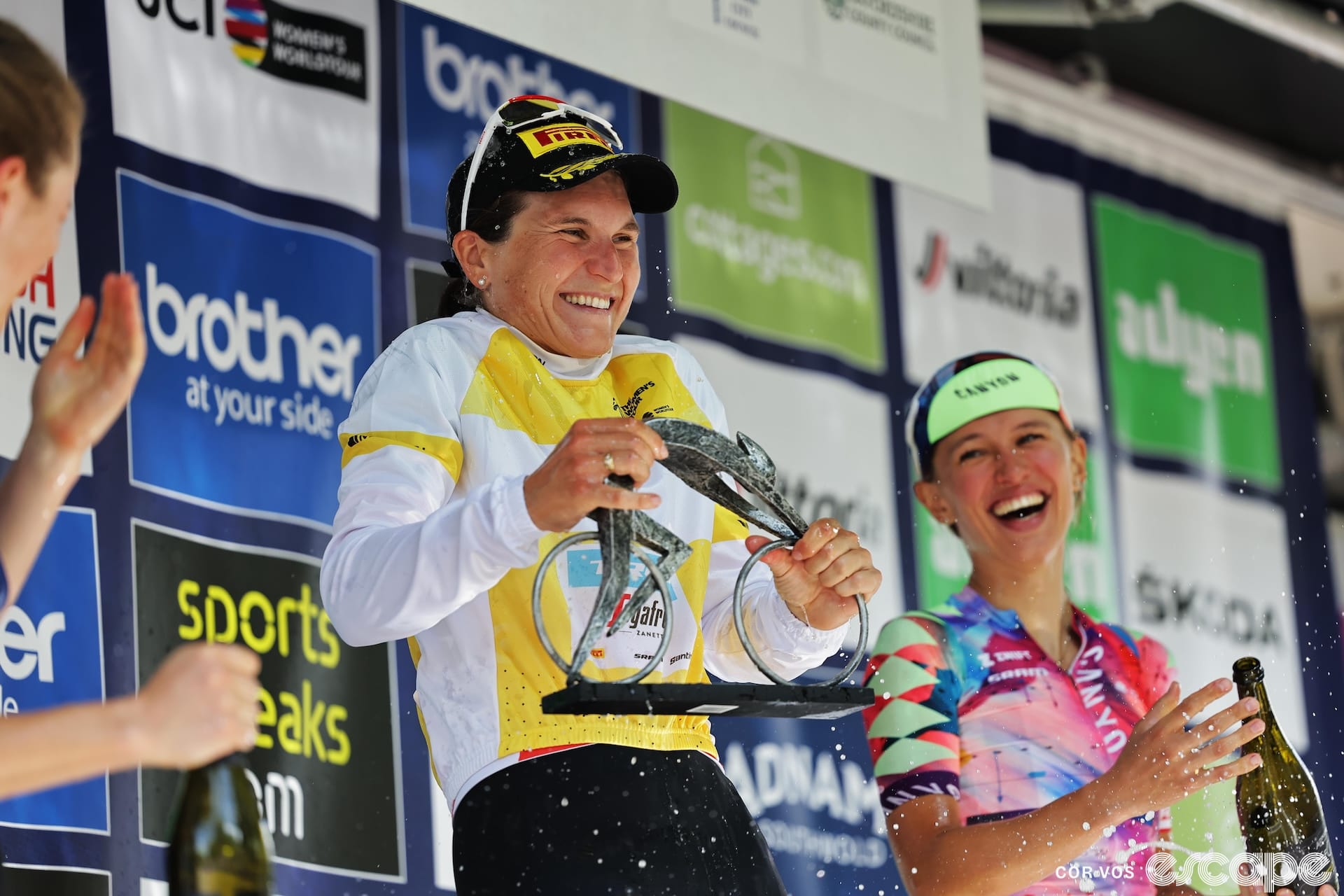Remco Evenepoel doesn't have to be at the Tour de France for the talk of the Tour to be Remco Evenepoel.
Speculation continues to grow that the world champion wants out at Soudal Quick-Step, despite being contracted until 2026. The two big names being mentioned are Ineos Grenadiers and Israel-Premier Tech, squads with far superior (or potentially far superior) budgets to the Belgian team.
There is no smoke without fire, a proverb Patrick Lefevere himself used in various interviews recently as he moved to quash rumours that he is considering selling the team. That possibility seems wildly unlikely, from what we can gather, but something does seem to be afoot.
There is a level of agitation going on behind the scenes, whispers are escaping from various camps. In some places, riders simply scrambling for contracts – an annual tradition for an unfortunate portion of the peloton – become conflated with grander speculation that a team could be in trouble. Elsewhere, there are those within the sport not close enough to the situation to know what's going on, but who can feel something moving and admit intrigue.
That's because if Remco Evenepoel was to leave Soudal Quick-Step, it would mark a new era of cycling transfers. The eight-figure sum it would require to make it happen dwarfs anything seen before in the sport, and shakes the ground upon which the new structure of long-term rider contracts was founded. The change in the sport that allows this to happen? The relatively recent growth of billionaire owners.
Contracts in pro cycling are not public, but we can map out broad figures. For Evenepoel to leave Soudal Quick-Step, the reported three years remaining on his contract will need to be bought out. His departure might also trigger clauses in sponsor agreements that tie levels of support for the team to Evenepoel's presence on it, and Lefevre wouldn't let Evenepoel go without some compensation for those drops in budget.
To buy all that out might run to the total tune of as much as €12 million, according to RadioCycling, who've been doing some deep digging on the matter. On top of that €12 million, you have to factor in the increase in base salary Evenepoel is seeking, likely to be between 2x and 3x what he is currently on. That would lift him towards the loftier heights of the €7 million that the most expensive rider in the peloton, UAE Team Emirates' Tadej Pogačar, is said to currently earn.
Those numbers are only feasible for a small selection of teams. Their wealth is also what attracts Evenepoel, as they have the resources necessary to build a true Grand Tour team around him. Ineos Grenadiers is the most obvious option, while Israel-Premier Tech also has the ambition, funds, and connections to Evenepoel's camp to potentially make a deal work.
Lidl-Trek, RadioCycling also suggests, could use its recent budget increase to consider spending the majority of it on one rider, while Bora-Hansgrohe is a surprise outside option due to Specialized apparently wanting to hitch a ride with Remco over the next decade. The German team already rides Specialized, and took on Ineos Grenadiers at last year's Giro d'Italia, and won. Should that Specialized bike supplier deal prove essential, it could make a deal tricky with Ineos Grenadiers and the team's longstanding use of Pinarellos, while it would likely prove less of an issue for the Factor-supplied Israel-Premier Tech.
"You know that I'm not going to be able to answer it," Sylvan Adams told Escape Collective of the Remco Evenepoel rumours from his team's hotel in Megève on the Tour de France's second rest day.
"I'm very, very open but you know that I'm not going to be able to answer a question about speculation on a specific rider that the media may have speculated about," he said. "I will say the mere fact they're writing about us puts a spotlight on the team, and that's good."
"I've been watching for his football skills to be honest and seeing if we can get him in one of the football teams," Ineos Grenadiers' team principal Dave Brailsford joked to ITV when asked about the Evenepoel transfer rumours after stage 14, the Brit now in charge of helping run Ineos' footballing investments too.
"In all seriousness, you wouldn't discuss a rider from another team under contract and you know he's a great rider but he's under contract with another team so I think, speculation is always rife in this sport, isn't it? And it's going to stay like that."
Escape Collective was watching the interview as it happened, and Brailsford said the last line of his interview with a big grin on his face. You can imagine that if an alpha male like Brailsford can't actually manage to get one over on Patrick Lefevere this time, he'd at least get some satisfaction from winding him up. For old time's sake.
More seriously, no outright denial from either player in this saga would suggest there are at least some wheels, somewhere, in motion. A secret bidding war? The ruminations among Evenepoel's camp about where would be the best place for him to land? Meanwhile, Lefevere tries desperately to hold on to the rider he's already pegged as the future of his team.
Soudal Quick-Step can't compete in the Grand Tour arms race
One immediate question is: why would Evenepoel leave? He has a long-term, still-lucrative-if-not-top-tier contract at the most popular team in his home country, with a squad used to winning the biggest bike races. Evenepoel's Vuelta a España victory and pre-COVID-positive Giro d'Italia pink jersey run suggest the team are well equipped to support him. But the Tour is a different beast, and it is the ultimate object of desire for a rider of the Belgian's talents.
UAE Team Emirates and Jumbo-Visma are currently the two dominant Grand Tour squads in the Tour's general classification – and have been since 2020. For Evenepoel to compete against the likes of Tadej Pogačar and Jonas Vingegaard, he needs a squad to match. The big problem is that not only is Patrick Lefevere's budget a lot smaller than Soudal's rivals, super domestiques are an increasingly expensive commodity, and crucially, there are very few whose contracts are ending at the end of this season.
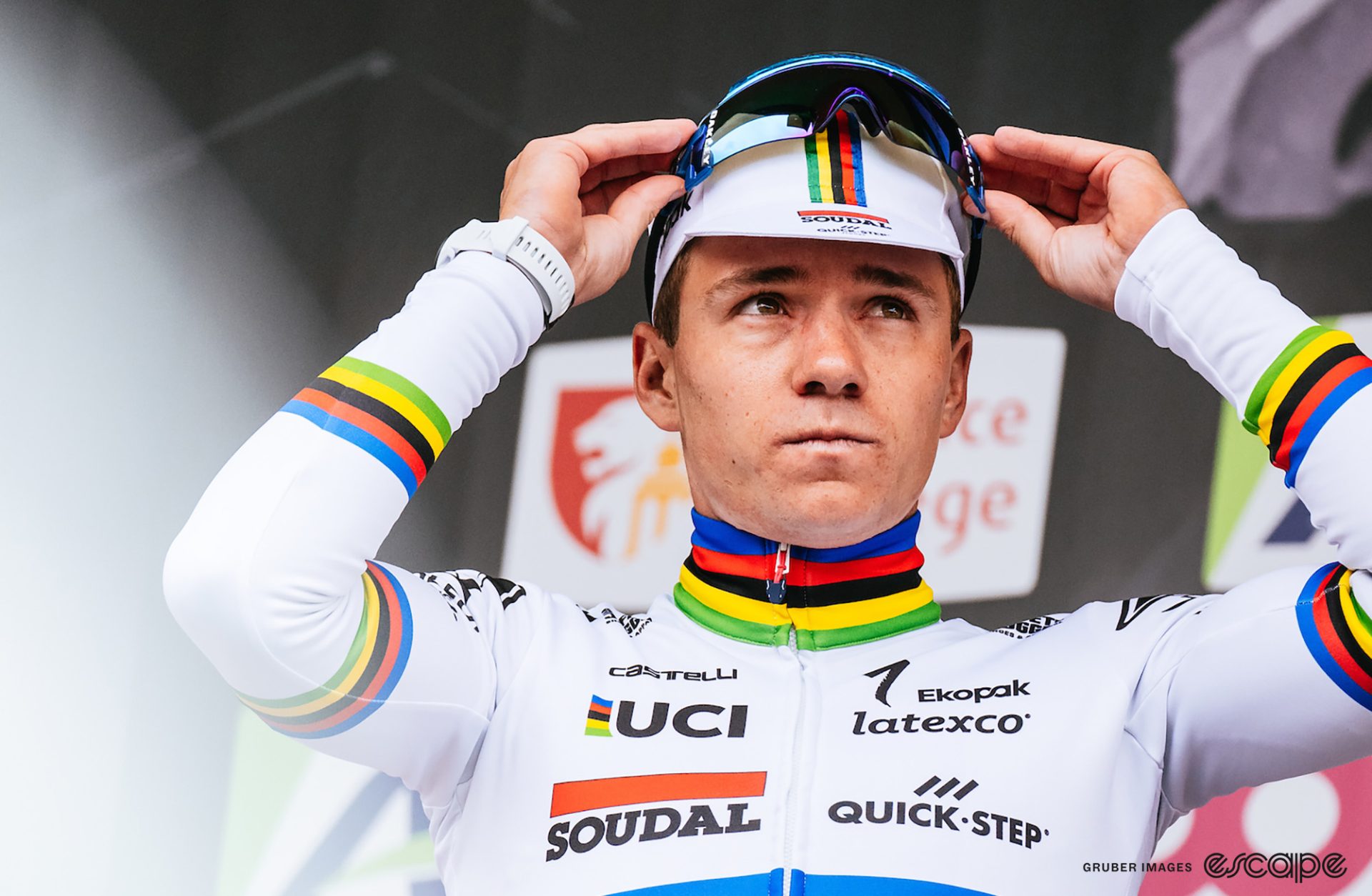
Of course, Lefevere has his own billionaire. Czech businessman Zdenek Bakala owns 80% of the team but isn't publicly involved in team business in the same vein as Adams or Ineos' Jim Ratcliffe. It is, perhaps, a toy of his rather than Ratcliffe's existential sporting retirement empire or Adams' mission-driven campaign. Bakala has invested sizeable sums to fortify the team since he got involved, but it would appear there are limits to his spending compared to the other rich men in play.
Patrick Lefevere is keenly aware of needing to support a rider of Evenepoel's character, and the Belgian is currently in the midst of transforming his squad from a Classics powerhouse into an Evenepoel-supporting cast. Fabio Jakobsen is out at the end of the year, destined for DSM-Firmenich, while another sprinter, Tim Merlier, had to sit out the Giro d'Italia and will also miss the Vuelta a España as no expense is spared for the team's 23-year-old world champion.
“Do I have to write a registered letter? Should I complain to the UCI that they are harassing Remco? And what if they deny? Should I call them all liars?” Lefevere told Het Laatste Nieuws of the approaches made to his under-contract rider. “It has to stop, but you can't stop it. It is an unfair pressure from Ineos Grenadiers. Sky started [trying to recruit Evenepoel] before he was a pro, and I beat them too quickly. It's that simple.
“They are going to deny everything, because according to the regulations they are not allowed to confess [that they are doing it]. I am always going to say no [to selling]. Selling a rider, I don't like that. It's not about a car, is it?"
Lefevere obviously doesn't want to lose Evenepoel, but he may have been planning for this possible eventuality.
Although Evenepoel continues to achieve despite the huge pressure placed upon him, the truth of the matter is until he rides the Tour (his debut appearance is expected in 2024) against Pogačar and Vingegaard, we won't know how he stacks up in that department. It's the fact he could be the third contender against those two that makes him so desirable to teams.
That he hasn't yet ridden a Tour could prove to be either a very fortuitous set of circumstances or, as is more likely when it comes to the wily Lefevere, clever planning. Lefevere may have foreseen a possible scenario where Evenepoel wants to leave his team and therefore, it's much more lucrative to sell such a talented rider on his potential than his performances, especially if those performances will be measured against Pogačar and Vingegaard.
All three riders turned pro the same season, 2019. But since the start of the 2021 season, when Vingegaard emerged as a Grand Tour contender, Evenepoel has faced off against them for a total of about 20 days each, and never in a race longer than seven days. By contrast, Pogačar and Vingegaard have faced each other on 97 race days in the same timeframe.
How much is a third-placed Tour rider worth to a team without a Tour de France contender? A reasonable amount, sure. How much is a rider who looks to maybe have the measure of the two most recent Tour champions, who themselves appear far stronger than the rest of the field? Name your price. In fact, naming prices may be exactly what is currently going on behind closed doors and possibly the final sticking point.
The Grand Tour-winning squad without the Grand Tour-winning rider
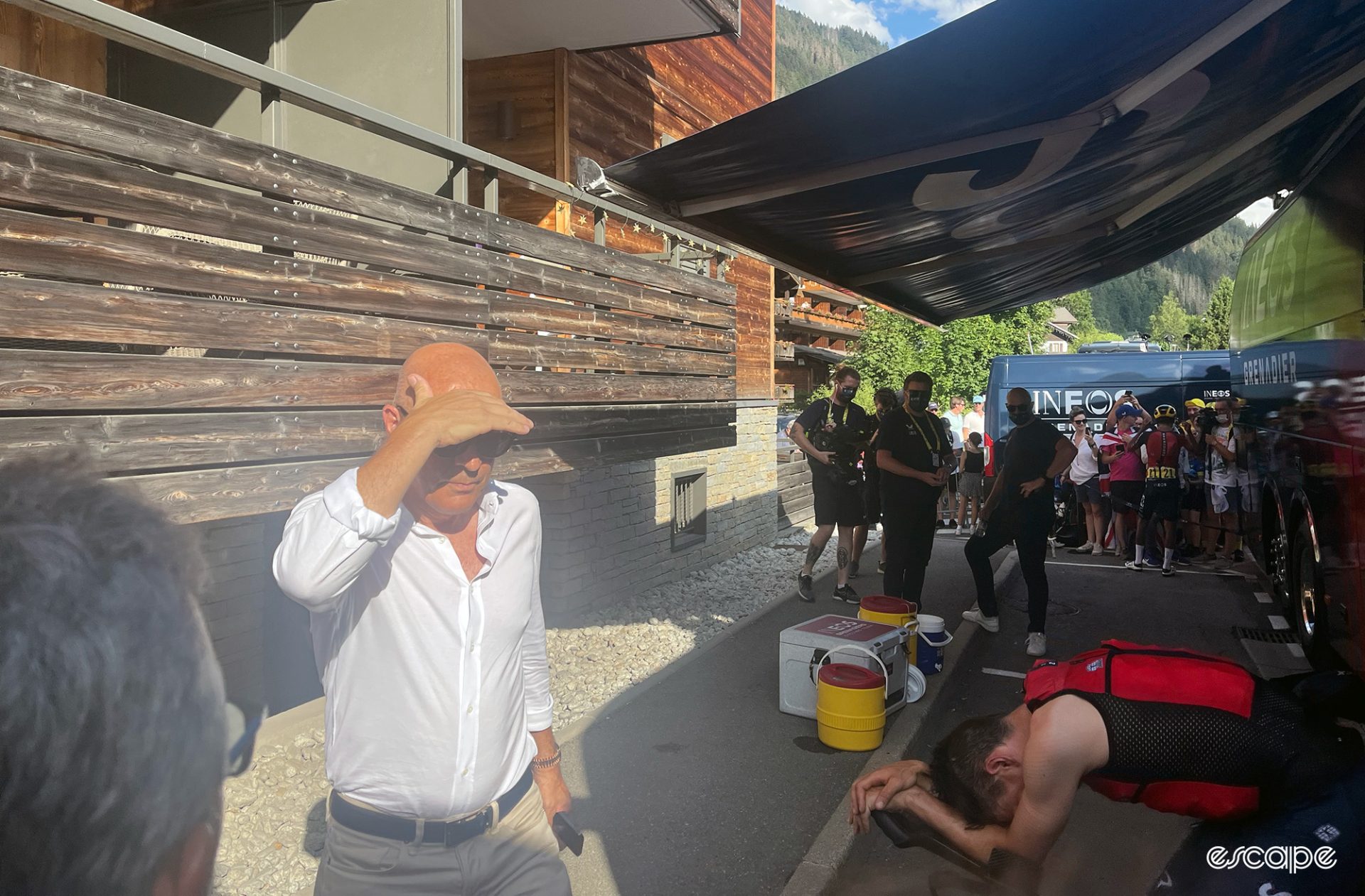
At Ineos Grenadiers, you have a WorldTour squad that is ready, and crying out for, a legitimate Tour de France contender. They have staff that have won the Tour a multitude of times previously, and are impatient for their next chapter. Increased attention on the Classics, with Paris-Roubaix a decent reward, has not satisfied Ineos' billionaire owner Jim Ratcliffe. He got an immediate taste of the Team Sky shell he bought with Egan Bernal's 2019 Tour de France win, mere months after agreeing to take over the funding of the British team. But two Giro d'Italia titles in between then and now were A) not won against top-tier representation from UAE Team Emirates and Jumbo-Visma and B) pink-coloured jerseys instead of yellow ones.
Ineos Grenadiers' team principal, Brailsford, is the Team Sky head honcho who has now been drafted up higher in Ratcliffe's sporting organisation, which owns football teams, backs sailing projects, and sponsors the All Blacks rugby team. Brailsford texted Lefevere following Evenepoel's world title win last year, letting him know that if he ever wanted to sell his star, Lefevere was to let him know. In nearly all circumstances, Lefevere would be reluctant to let Evenepoel go – the price of his team's sponsorship contracts directly correlate with the appearance of Evenepoel's name in the team's squad list. Yet meetings still took place between Evenepoel's representatives and Ineos Grenadiers over the winter.
The big question is, if a deal couldn't be done over the winter, what's changed? Has Ratcliffe finally got sick of waiting around and is willing to open the cheque book and chuck a (for him) few quid at a legitimate Tour contender? Have Ineos Grenadiers realised that a post-crash Egan Bernal may never reach his best previous level, and that Tom Pidcock's development into GC material is ongoing, harder, and not as guaranteed as it first appeared?
What we do know is that Brailsford is back at the Tour de France. Arriving on stage 14 in time to see his team's second stage win in two days courtesy of Carlos Rodriguez (another potential future Tour contender, who the British team are likely losing to Movistar), Brailsford was dressed in a white shirt and brown Tom Ford cords. His dad lives in that day's stage finish town of Morzine and also Ratcliffe was having a party at his place over in nearby Courchevel – for which Brailsford was certainly dressed. Plus, Tour de France rest days are big days for contract talk, and Brailsford still rules the roost at Ineos Grenadiers even if he isn't physically as present as he used to be.
The next day, stage 15, Brailsford could be spotted out the front of the team bus, now dressed in team-issue Grenadier sweatshirt, his attention buried in whatever task he had at hand that moment. The holidaymaker air he had the day before was gone, yet his words about missing cycling were being proven true in real time as he dove back into the sport.
Is the imminent arrival of Evenepoel re-galvanising how much time he will be able to dedicate to cycling? Ratcliffe's £6 billion bid for Manchester United has been taking up a lot of Brailsford's time, yet should that prove unsuccessful, Evenepoel's first Tour is a tantalising prospect to capture the imagination. What the Manchester United bid also reveals is that gathering together a dozen or so million to buy a cyclist is no sticking point. They have the means to literally move the goalposts.
The second billionaire
Israel-Premier Tech's property tycoon Adams describes himself as "ambitious and impatient" which is a blessing and a curse in a sport where it's hard to achieve. The natural path of Adams' ambition, now stage win success has been achieved multiple times, is to go one step further and try to become a squad that fights for the overall win.
Like their rivals, they are in the business of recruiting young talents who they hope will develop into world-beaters.
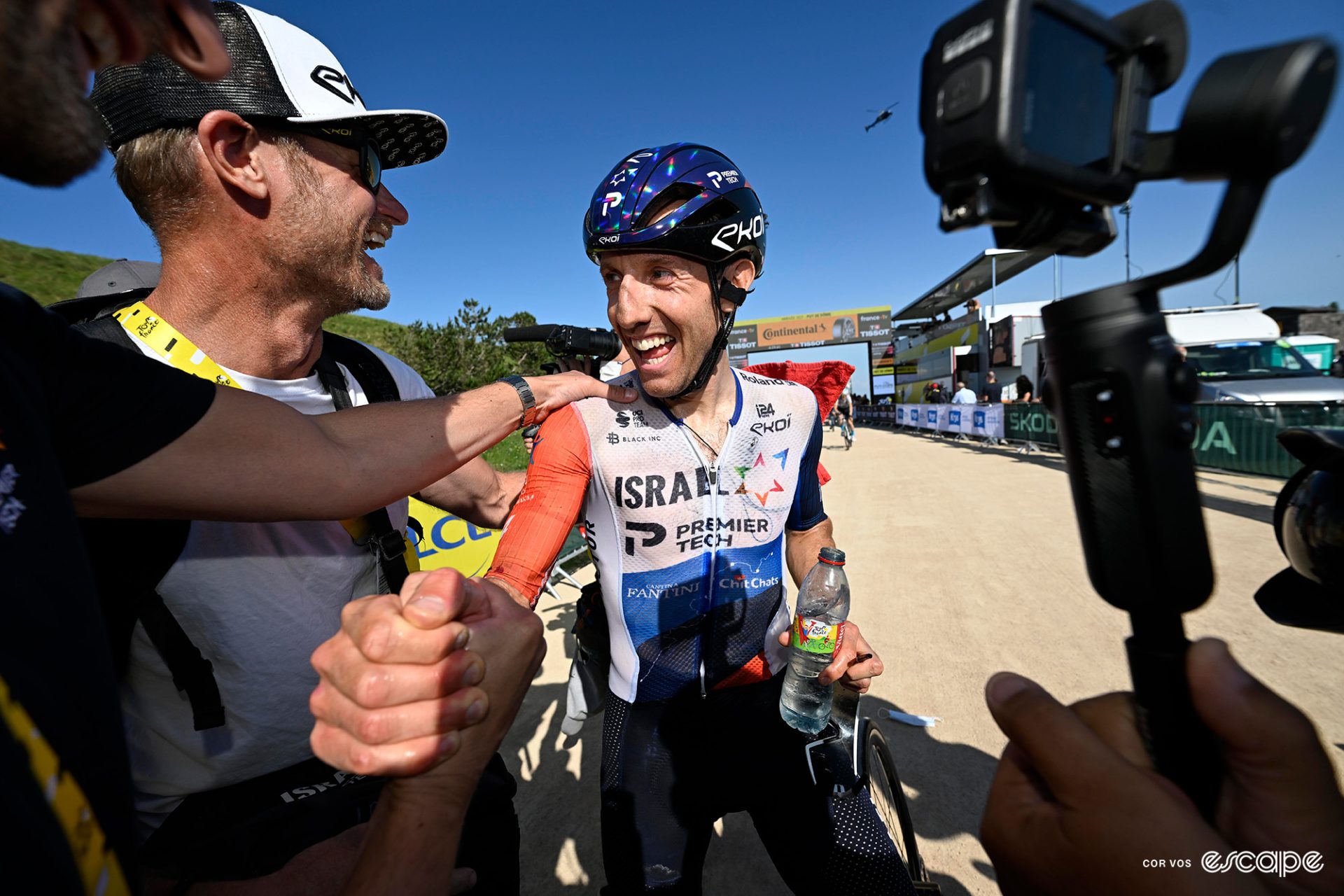
"It's become a two-man race," Adams said of this Tour de France. "If Remco were here, it'd be a three-man race. So you have to fight with that calibre of rider to be relevant. I think that we will have to build up to that and we are recruiting young talents. We have a huge [under] 23 development team."
In Canada and Israel (Adams has dual nationality), he says the team has a scouting edge as those are countries they are deeply embedded in. But in the more traditional cycling nations, they will be at a disadvantage.
"It's hard for us to go grab a young Remco Evenepoel, where these guys are recruiting him all his life and his family knows them," Adams explained. "I can't tell you when we will have a Grand Tour GC contender. We tried to jump over that and get a GC recruit in Chris Froome, the greatest Grand Tour champion of his generation. Obviously, it hasn't worked out exactly but we tried to do it that way and that's hard to do. So, at the same time, we want to build from the bottom.
"But if there was an opportunity to perhaps recruit a rider that had an affinity to our team, one of the excellent riders ..." he said, before adding, "I'm not talking about the big three, because that's a high bar and they're probably very well ensconced in their respective teams."
Recently, Adams came out and said his Froome experiment had not been value for money, and it would seem there is a scenario playing out where Adams and Israel-Premier Tech would like to be rid of Froome, while the four-time Tour champion probably wants to continue picking up a hefty paycheque. Discussion over whether Froome's future contract years are optional or guaranteed – and at whose option – will play out over the next few months, and it could open up a chunk more budget as well as providing a clean slate for the squad.
For Adams, his driving goal is, obviously, the promotion of Israel, which for him is best done by winning.
"Everyone notices a winner," he said. "We are not relevant unless we are out there doing good things. We win a stage like Mike [Woods] won the other day, we draw attention to our brand. And if we are nothing or just pack-fill, nobody talks about us."
What is clear from Adams' thought process is that it's not the price that is preventing him from signing a rider like Evenepoel. Israel-Premier Tech are clearly the less-experienced squad compared to Ineos, and their talent pool is not as deep, but Evenepoel does have ties to some of the staff there, and you would imagine he would have a lot more say about how the team is structured than if he went to Ineos. There is space for Israel-Premier Tech to become Evenepoel's team.
At Ineos Grenadiers, he would be the latest star GC rider, who would still likely have to do things the Brailsford way. To use a football analogy, as this is where the business side of cycling seems to be slowly heading, whether Evenepoel is looking to be the biggest Galáctico of an established (and currently dormant) dynasty or follow the route of Kylian Mbappé's hold over PSG, we'll have to wait and see.
What's next
When will we know where Evenepoel is going? Indeed, will it even happen?
Things would seriously have to unravel for any huge shifts to take place before Evenepoel's title defences at the Glasgow Worlds and the Vuelta. What is clear is that Evenepoel's camp has moved and Lefevere is countering in response. Things are being played out in the media; the water is being tested.
For Lefevere, Evenepoel's departure could prove ruinous. A team geared to a rider no longer present is a void, and one which sponsors won't want to pay for. But the right price could offer Lefevre, the sport's ultimate survivor, a chance to stay alive a while longer.
For Evenepoel, the stakes are equally high. So far, he's risen on results, but also potential, which will be tested the moment he finally goes head to head with Vingegaard and Pogačar in a Grand Tour. It could be his making or his downfall.
Did we do a good job with this story?

